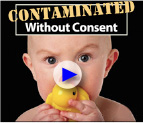December 19, 2013
Toxic Chemical Found in Toys and Vinyl Plastic Linked to Cancer
Added to California Proposition 65 List - Phthalate DINP
(San Francisco) Toxic chemical diisononyl phthalate (DINP), manufactured by Exxon Mobil and other petrochemical companies, is being added to the California list of chemicals known to cause cancer, known as Proposition 65, this Friday December 20th.
The California Office of Environmental Health Hazard Assessment (OEHHA) said, “The CIC (Carcinogen Identification Committee) determined that the chemical was clearly shown, through scientifically valid testing according to generally accepted principles, to cause cancer.” DINP is a phthalate plasticiser widely used in vinyl (PVC) soft and flexible toys and childcare items. Soft vinyl has been very popular for toy production. Famously, soft vinyl “ rubberduckies” are an iconic use of this carcinogenic chemical in toys.
“Cancer is one of the leading causes of death in the U.S. and exposures to chemicals may explain at least some of these cases,” explains Sarah Janssen, MD, PhD, MPH, assistant professor at UCSF. “DiNP and other phthalates are frequently found in our home environments and as a result, in the bodies of the majority of people tested. This contamination with a now recognized cancer causing substance is due to the failed oversight of chemicals. Today’s listing will allow consumers to be better informed about their exposure to toxic chemicals”
Mike Schade, work group co-leader for the National Work Group for Safe Markets, and with the Center for Health, Environment & Justice (CHEJ) adds, “DINP and other phthalates linked to harmful health impacts are found in vinyl raincoats, backpacks, binders and other school products used by children. The chemical industry, led by phthalate manufacturer Exxonmobil, has spent millions lobbying against restrictions on these chemicals. It’s time for Exxon Mobil to stop toying around with our children’s health. We need the Consumer Product Safety Commission to finalize its ruling on phthalates now to prevent further exposure to children from toys made with these cancer-causing chemicals.”
Nancy Buermeyer, senior policy strategist with the Breast Cancer Fund. “While Congress works to reform the Toxic Substances Control Act, the chemical industry is fighting against environmental health protections that would prevent children’s exposure to chemicals like DINP. Why should parents need to become chemical experts just to buy safe products for their children? We need strong environmental health protections from Congress and the Consumer Product Safety Commission now.”
“Small retailers are in the business of providing products to make the lives of families and children better, not unknowingly putting their health in danger. Small businesses and consumers both need the information and transparency to drive these toxic chemicals out of the marketplace. At the same time we must do all that we can to create the safer alternatives to meet consumer demand and build our businesses,” said Frank Knapp, President and CEO, South Carolina Small Business Chamber of Commerce and co- Chair of the American Sustainable Business Council Action Fund.
"If retailers like buybuy BABY and Babies"R"Us stop selling children's products that contain toxic chemicals, people will stop buying them, and children will no longer be exposed," said Kathy Curtis, executive director of Clean and Healthy New York, which houses the Getting Ready For Baby campaign. "Getting Ready For Baby is urging major infant and child care retailers to require disclosure from children's products makers about their use of hazardous chemicals like DINP, and to only carry the safest items for their young, vulnerable customers."
“Existing health protections from phthalates are totally inadequate to protect pregnant women and children from harmful health effects - from reproductive harm to asthma. In the absence of federal action it is critical for states like California and Maine to take the lead on addressing the dangers of phthalates in our homes,” said Emma Halas-O'Connor, Coalition and Advocacy Coordinator Environmental Health Strategy Center.
Eleanne van Vliet, MPH, Director, Toxic Chemicals Research, As You Sow, added, "The addition of DINP to California's Proposition 65 list as a carcinogen is a great step forward in reducing and removing all phthalates from consumer products including children's toys, food containers and personal care products --and should influence the manufacturing of consumer products across the U.S, such that all American consumers, not just Californians, can enjoy safer and healthier, phthalate-free products."
In 2007, California banned use of DiNP and 5 other phthalates in children’s toys and childcare articles. Congresspassed a similar ban as part of the Consumer Product Safety Improvement Act (CPSIA) in 2008. DINP is one of three phthalates that were temporarily banned in the CPSIA pending a scientific review by a Consumer Product Safety Commission (CPSC) Chronic Hazard Advisory Panel (CHAP). Once the CHAP’s report, which is long overdue, is released, the CPSC will make a decision on whether to make the ban on DINP permanent. The listing of DINP as a carcinogen under Proposition 65 adds further evidence of the need to keep this toxic chemical out of our children’s toys and consumer products.
The American Chemistry Council, whose members include phthalate manufacturer ExxonMobil, has said it is challenging California’s ruling.
More info: SafeMarkets.org
Available for Interviews (for media assistance, Stephenie Hendricks, Coming Clean, 415 258-9151 stephdh@earthlink.net)
Nancy Buermeyer, Senior Policy Strategist, Breast Cancer Fund 202.213.3384, nbuermeyer@breastcancerfund.org.
|
Kathleen A. Curtis, LPN, Executive Director, Clean & Healthy New York and Co-Chair, Alliance of Nurses for Healthy Environments Policy/Advocacy Work Group, 518.708.3922 (cell), 518.355.6202 (home office), clean.kathy@gmail.com, www.cleanhealthyny.org. Emma Halas-O'Connor, Coalition and Advocacy Coordinator, Environmental Health Strategy Center, 207.699.5799 (direct) 207.272.9581 (cell), ehalasoc@preventharm.org. Sarah Janssen, MD, PhD, MPH, Assistant Clinical Professor, University of California, San Francisco 415.722.0120 sarah.janssen@ucsf.edu. Frank Knapp, founder and CEO of the South Carolina Small Business Chamber of Commerce, and vice chair of the American Sustainable Business Council 803.252.5733 sbchamber@scsbc.org. |
Mike Schade, Mind the Store Campaign Director for Safer Chemicals Healthy, Families, mikeschade@saferchemicals.org
Eleanne van Vliet, MPH, Director, Toxic Chemicals Research, As You Sow 510.735.8154.
# # #




